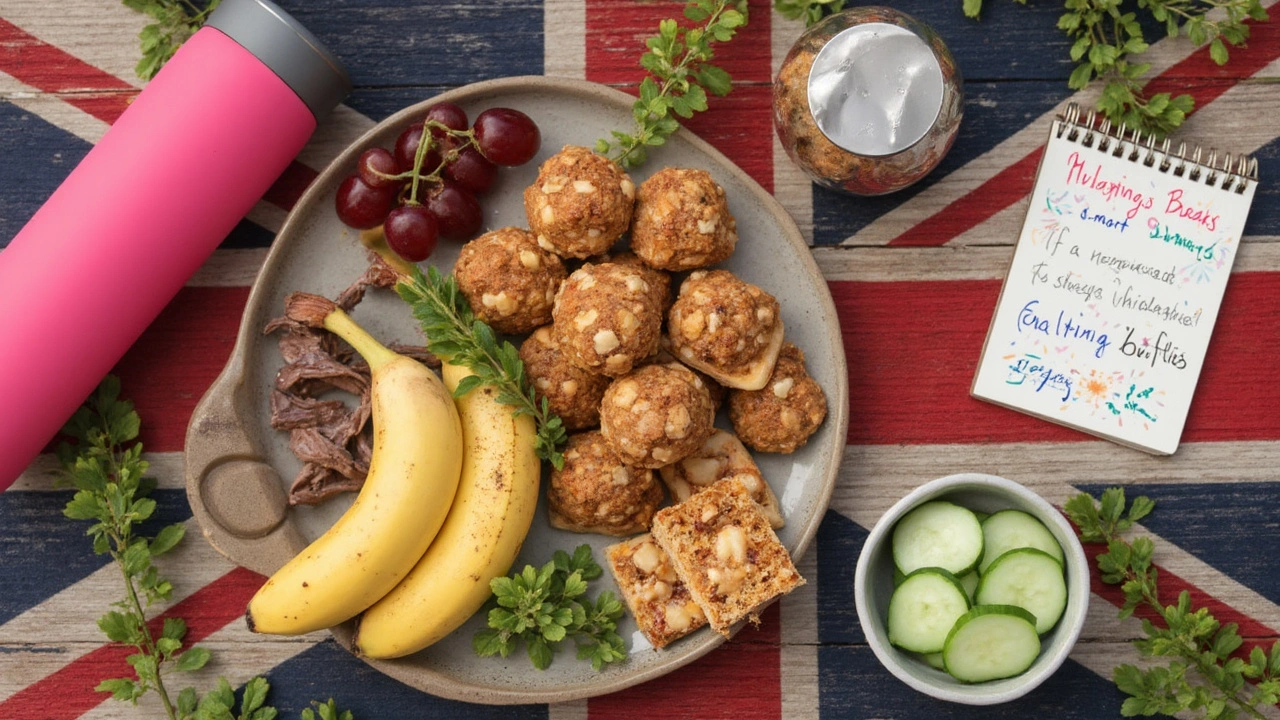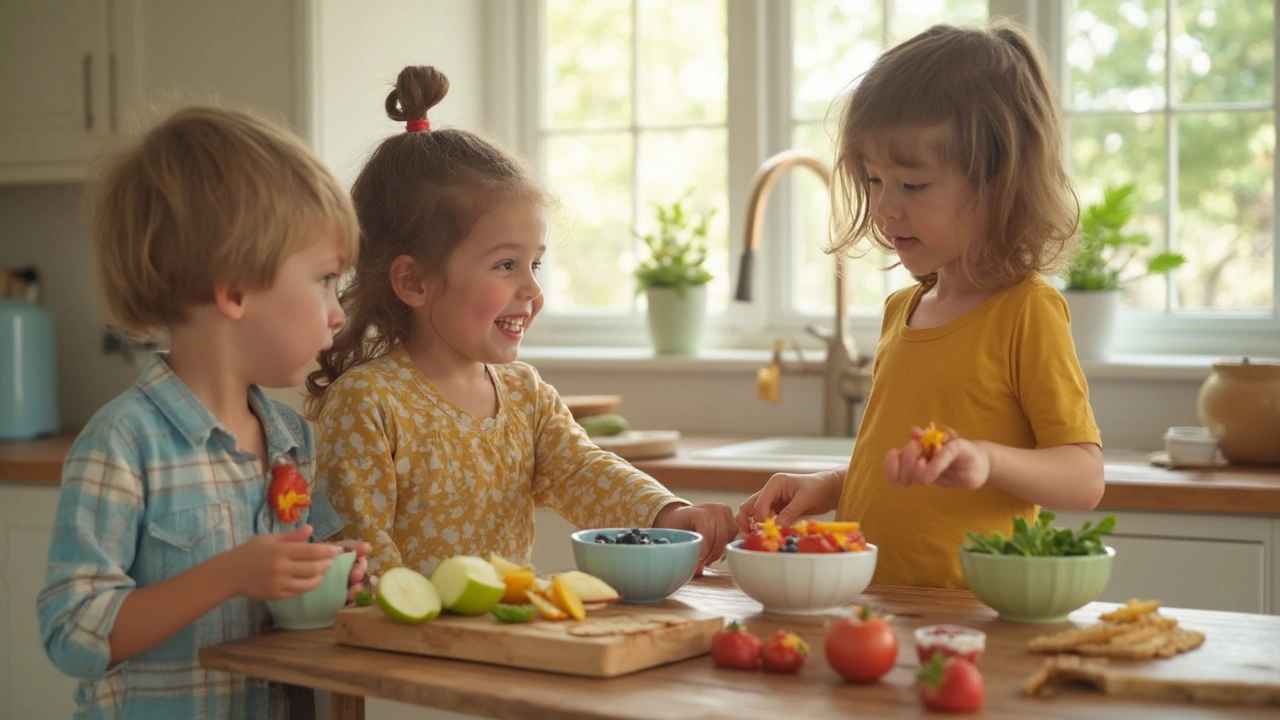Snacks really do make or break a balanced diet. Ever found yourself starving at 4 p.m. and reaching for a chocolate bar, only to crash an hour later? You’re not alone. The right snacks keep you satisfied, help you skip the junk, and stop you from overeating at your next meal.
Most people think snacks are a guilty pleasure, but the truth is, they’re a secret tool for steady energy and better focus. The trick is choosing snacks with a good mix of protein, fiber, and healthy fats. Think apple slices with peanut butter, Greek yogurt with berries, or a handful of mixed nuts. Simple? Yes. Effective? Absolutely.
Don’t assume healthy snacks are complicated or expensive—most are just as easy as grabbing chips or cookies. Plus, eating smart snacks means less temptation later. Studies show when you snack mindfully, you're less likely to binge during dinner. So, it’s not about cutting out snacks—it’s about making them work for you.
- Why Snacks Matter More Than You Think
- What Makes a Snack Healthy?
- Common Snack Pitfalls (and How to Avoid Them)
- Easy Snack Ideas for Busy Lives
- Smart Snacking Habits That Last
Why Snacks Matter More Than You Think
Snacks have a bit of a mixed reputation. People love them, but they also get blamed for unhealthy eating habits. Here’s the deal: when you pick the right ones, snacks keep your energy up, stop you from getting cranky, and make your main meals a lot more balanced.
Ever notice how skipping your mid-morning snack leaves you hitting the vending machine at 3 p.m.? That’s not just lack of willpower. Without regular, steady fuel, your blood sugar drops. Your brain actually craves a quick fix—usually something high in sugar or fat—just to get through the day.
Studies from places like Harvard show that healthy snacking can keep blood sugar stable and improve concentration, especially during long stretches between meals. Kids and teens who snack smart tend to perform better in school, and adults have steadier moods and more focus at work.
Beyond just fighting hunger, regular, smart snacking can help maintain a healthy weight. When you’re not ravenous by meal time, you don’t overeat. And get this—people who include healthy snacks in their routine often eat more vitamins, minerals, and fiber than people who mainly eat three large meals a day.
| Benefit | What the Research Shows |
|---|---|
| Steadier energy | Reduces mid-day crashes and brain fog |
| Better focus | Helps with memory and staying on task |
| Weight control | Leads to less overeating at meal times |
| Healthier choices | Increases intake of vitamins, fiber, and minerals |
| Blood sugar stability | Supports healthy glucose levels, especially for people with diabetes |
Picking the right healthy snacks is a small change that can make a huge difference. You’ll feel more energetic, make better meal choices, and even reduce those annoying cravings for junk food later in the day. It’s not about snacking less—it’s about snacking smarter.
What Makes a Snack Healthy?
A snack turns healthy when it actually helps your body instead of just filling you up for a bit. The best snacks have a few things in common: they keep you satisfied, give you steady energy, and don't drown you in sugar or empty calories. You want your snack to last—nobody likes being hungry again in 30 minutes.
The magic is in the combo. Go for foods with protein, fiber, and a little healthy fat. This mix keeps your blood sugar stable so you won't end up zonked out or craving more sugar.
- Healthy snacks are low in added sugar. Watch out for so-called “healthy” granola bars—they can pack as much sugar as candy.
- They have real, simple ingredients. If you can't pronounce half of what's in it, maybe skip it.
- Portion size matters. Even nuts become a calorie bomb if you eat the whole bag—aim for a small handful instead.
- They include foods that actually fill you up, like whole grains, veggies, or lean proteins.
Wondering what these ingredients look like in real life? Here’s a quick look at how different snacks stack up:
| Snack | Protein (g) | Fiber (g) | Added Sugar (g) |
|---|---|---|---|
| Apple with peanut butter | 4 | 4 | 0 |
| Greek yogurt (unsweetened) with berries | 12 | 3 | 0 |
| Granola bar (average, store-bought) | 2 | 1 | 12 |
| Handful of mixed nuts | 6 | 3 | 0 |
If you’re ever confused at the grocery store, check the nutrition label. Look for snacks with at least 3 grams of protein and fiber per serving, and skip anything with more than a couple grams of added sugar. Those tiny tweaks add up over time, and you’ll feel the difference—less hunger, more energy, no 4pm meltdown.

Common Snack Pitfalls (and How to Avoid Them)
You’d be surprised how many snacks that look healthy can actually mess with your eating goals. The biggie? Packaged snacks loaded with sugar, salt, or weird ingredients you can’t even pronounce. Granola bars are a classic example—some have just as much sugar as a candy bar. That’s not doing you any favors if you’re trying to eat better.
It’s super easy to underestimate calories from snacks, especially when munching straight from a bag. Portion control really matters. Here’s a quick look at how common snacks can stack up compared to healthier choices:
| Snack | Typical Calories | Added Sugar (g) |
|---|---|---|
| Potato Chips (1 oz) | 150 | 0 |
| Granola Bar (1 bar) | 180 | 12 |
| Greek Yogurt (plain, 6 oz) | 100 | 4 (none added) |
| Apple Slices & Peanut Butter | 160 | 0 |
Late-night snacking is another trap. When you snack right before bed—especially on junk food—it makes it much harder to notice fullness and you usually end up eating more than you need. Researchers have found late-night snackers are more likely to have weight management problems and sleep interruptions.
Here are some ways to dodge these common healthy snacks mistakes:
- Read the label. Check for added sugars, sodium, and ingredient lists. If it reads like a chemistry experiment, maybe skip it.
- Pre-portion your snacks. Instead of eating straight from the bag, use small containers or snack-size ziplocks. It sounds fussy, but it actually keeps you from mindless overeating.
- Watch out for "low-fat" traps. The food industry loves to market low-fat snacks, but they often jack up the sugar to make up for flavor. Fat isn’t the enemy—it’s about the type and amount.
- Plan snacks like you do meals. Keep simple, wholesome options on hand. If you’re hungry and all you have is a sleeve of crackers, guess what you’ll eat?
Swapping even one processed snack for a fresh, real-food snack each day can make a difference. Plus, your energy levels will thank you later.
Easy Snack Ideas for Busy Lives
Life gets busy, but eating smart doesn’t have to slow you down. The key is picking snacks that you can prep ahead of time or grab on the go, so you avoid vending machines and sugary impulse buys.
Here are tried-and-true snack options that don’t eat up your time:
- Greek yogurt and berries: Loaded with protein and antioxidants. Just scoop into a container in the morning and you’re set.
- Baby carrots and hummus: Chop veggies for the week, store them in the fridge, and portion out single servings of hummus in small containers.
- Nut butter on apple or banana slices: This combo gives you fiber plus some healthy fat to keep you full.
- Handful of mixed nuts or trail mix: Look for unsalted versions if you watch your salt. Store single portions in bags so it’s grab-and-go.
- String cheese and whole grain crackers: You’ll get a mix of protein and carbs for lasting energy.
- Roasted chickpeas: They’re crunchy, high in fiber, and surprisingly filling. You can roast a batch at home if you like.
- Rice cakes with avocado: Top with a squeeze of lemon or sprinkle of seeds for extra nutrients.
If you’re curious which healthy snacks are the most practical, check out this quick nutrition breakdown of some popular options:
| Snack | Calories | Protein (g) | Fiber (g) |
|---|---|---|---|
| Greek yogurt (plain, 150g) | 90 | 15 | 0 |
| 1 medium apple + 2 tbsp peanut butter | 190 | 4 | 4 |
| 1 oz. mixed nuts | 160 | 5 | 3 |
| Roasted chickpeas (30g) | 120 | 6 | 5 |
| String cheese | 80 | 7 | 0 |
| Baby carrots (100g) + hummus (2 tbsp) | 100 | 2 | 4 |
Keep prepped snacks in visible spots in your fridge or pantry, so they’re the first thing you see when hunger hits. Lots of people find it helps to portion snacks out at the start of the week, making healthy choices almost automatic. All of these choices pack well in a lunchbox or backpack and don’t leave you with sugar crashes later.

Smart Snacking Habits That Last
Building snacking habits that actually stick isn’t about willpower. It’s about making small changes that fit with how you really live. Setting up your environment and changing routines are key tricks that stop you from grabbing the nearest junk food.
A solid habit starts with being prepared. Studies show people are 45% more likely to make healthy choices if snack options are visible and ready to grab. That means prepping your snacks ahead of time and keeping them where you can see them—like washed grapes on the middle fridge shelf or portioned nuts on your desk.
Another thing that helps is recognizing genuine hunger versus just being bored or stressed. If you’re not sure, drink a glass of water and wait a few minutes. Still hungry? Go for a healthy snack that includes protein or fiber—they keep you full longer.
- Keep snacks simple and consistent. Always having a go-to like baby carrots and hummus or yogurt with fruit makes decisions easier.
- Watch the portion sizes. Pre-portion snacks into small containers or bags so you don’t end up finishing a whole bag of nuts or popcorn without noticing.
- Snack mindfully. Don’t eat at your computer or in front of the TV all the time. Focusing on what you eat actually helps your body notice when you’re full.
- Mix it up now and then to avoid snack boredom—and yes, it’s real. Swap out sweet for savory or try new combos like roasted chickpeas or a boiled egg with salsa.
| Habit | Impact on Snack Choices |
|---|---|
| Prep snacks weekly | 58% report healthier choices |
| Snack in front of screens | 35% eat more than intended |
| Choose protein-rich snacks | Stay full up to 2 hours longer |
Once you see how good habits pay off—less afternoon crashes, better focus, more stable moods—it’s hard to go back. The magic is all about planning a little, keeping things easy, and paying attention to what actually fills you up. When healthy snacks become second nature, sticking with a balanced diet gets so much easier.





